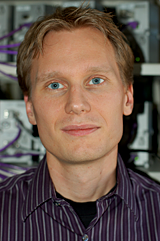Researchers very critical of the security of the electricity grid
Smart electricity grids are the future and the IT company Cisco is the only company to have assessed the market in communication products in the smart electricity grid which alone is worth SEK 70 billion over the next five-to ten-year period. But the way to the smart electricity grid's entry into our homes is lined with challenges. Now two KTH professors are raising their voices about the lack of security in today's grid and tomorrow’s smarter cousin.

Our appliances and our electricity meter will be connected to our mobile phone and our computer so that we can put on a wash when the price is lowest. Even the car battery and solar cells will form a part of the electricity network and talk to our computers and mobile phones so we know when we have an energy surplus that we can sell on or choose to store until the next power failure or price shock. This is an example of what smart electricity grids will provide us with in the immediate future.
There is however a major problem. Security. And the problem already exists now.
“It's crazy how unsafe it is today. Someone familiar with the system of monitoring and controlling the electricity network could get into the network and manipulate for example the power plants and make money on it or create problems," says Henrik Sandberg, assistant professor in the Department of Automatic Control at the School of Electrical Engineering at KTH.
But where do you start? It is a very important issue, says Henrik Sandberg.
“You have to start looking at the system we have today. In the smart electricity grid will be a computer that will be doing people's jobs, everything will then go really quickly. Therefore, the computer must get better at detecting abnormalities in the electricity network," says Henrik Sandberg.
Together with György Dán, Henrik Sandberg has been examining how to incorporate encryption and more sensors in today's system to make it harder to cheat the system today as well as tomorrow. There are many questions they need to answer in their work. Where in the network should the sensors be placed, and do they need to be encrypted? How should it be when the systems are eventually automated? What sort of solutions can provide a high level of accessibility in the network regardless of attacks while maintaining high integrity in a cost effective way?
"With many sensors in the networks, an attacker would need to corrupt many sensors to create trouble to avoid getting caught," says György Dán, assistant professor in the Department Communication Networks School of Electrical Engineering at KTH.
His colleague, Henrik Sandberg agrees.
“These changes can already be introduced today, but it becomes even more important when you go over to the smart electricity network that will connect together all of the systems. More sensors and more encryption is a way to make it harder to cheat the system," says Henrik Sandberg.
For more information, contact Henrik Sandberg 08-790 72 94 / hsan@ee.kth.se or György Dán at 08-790 42 53 / gyuri@ee.kth.se.
Peter Larsson